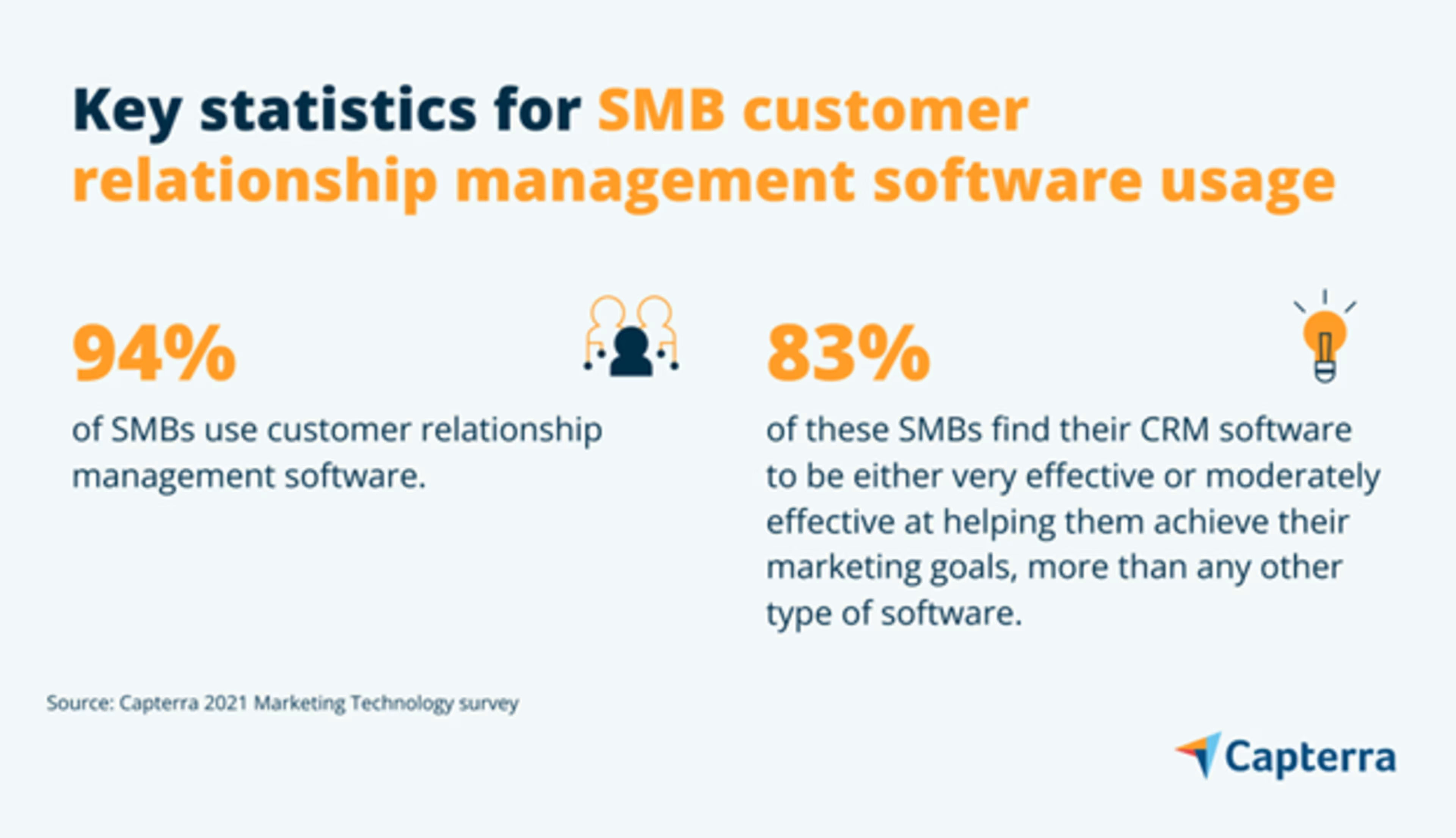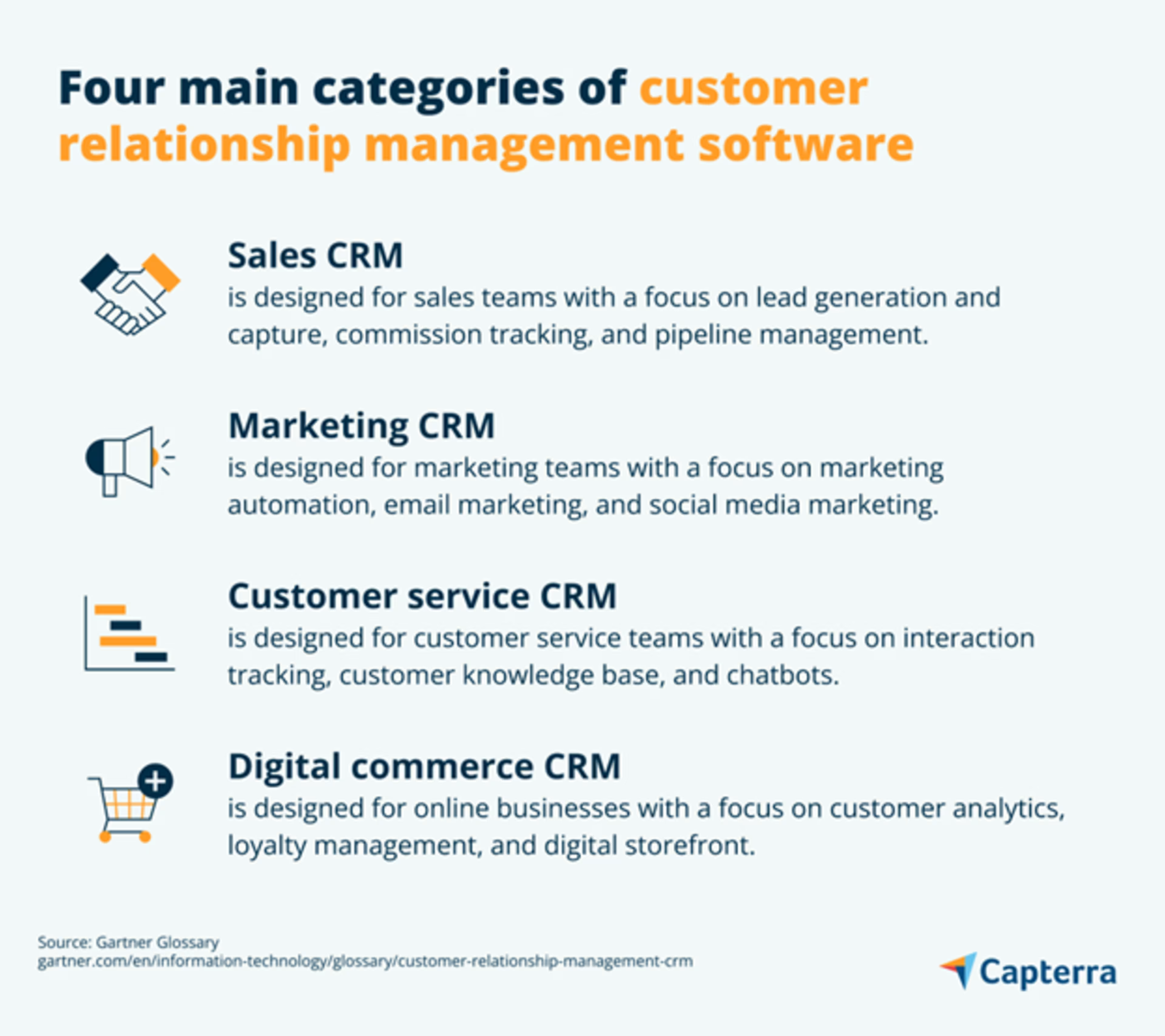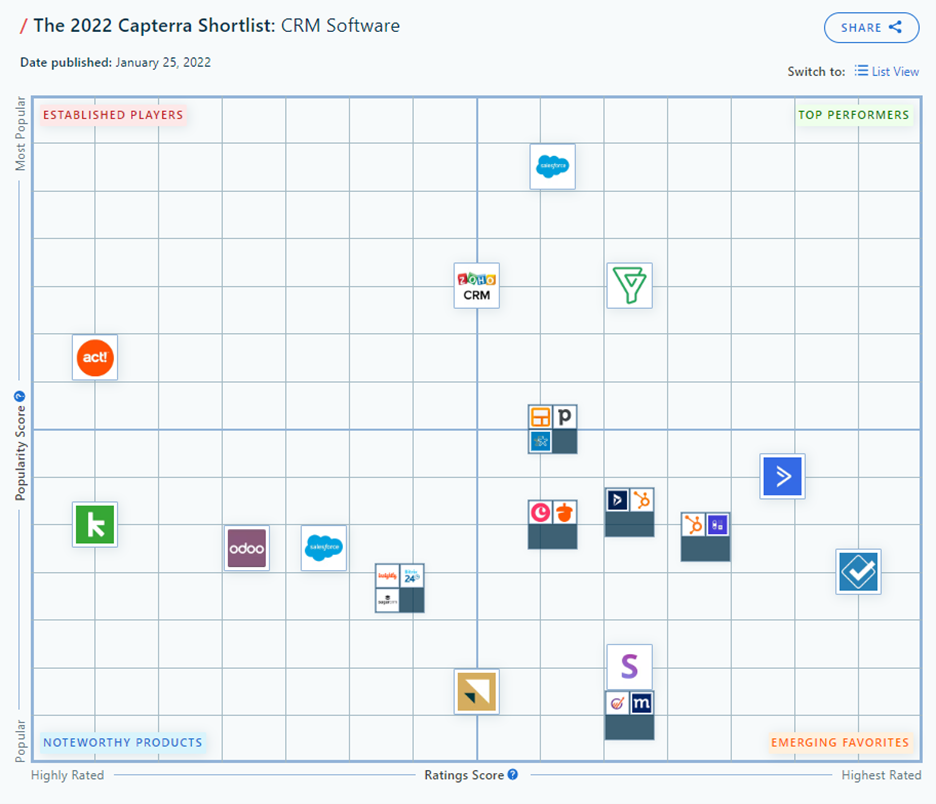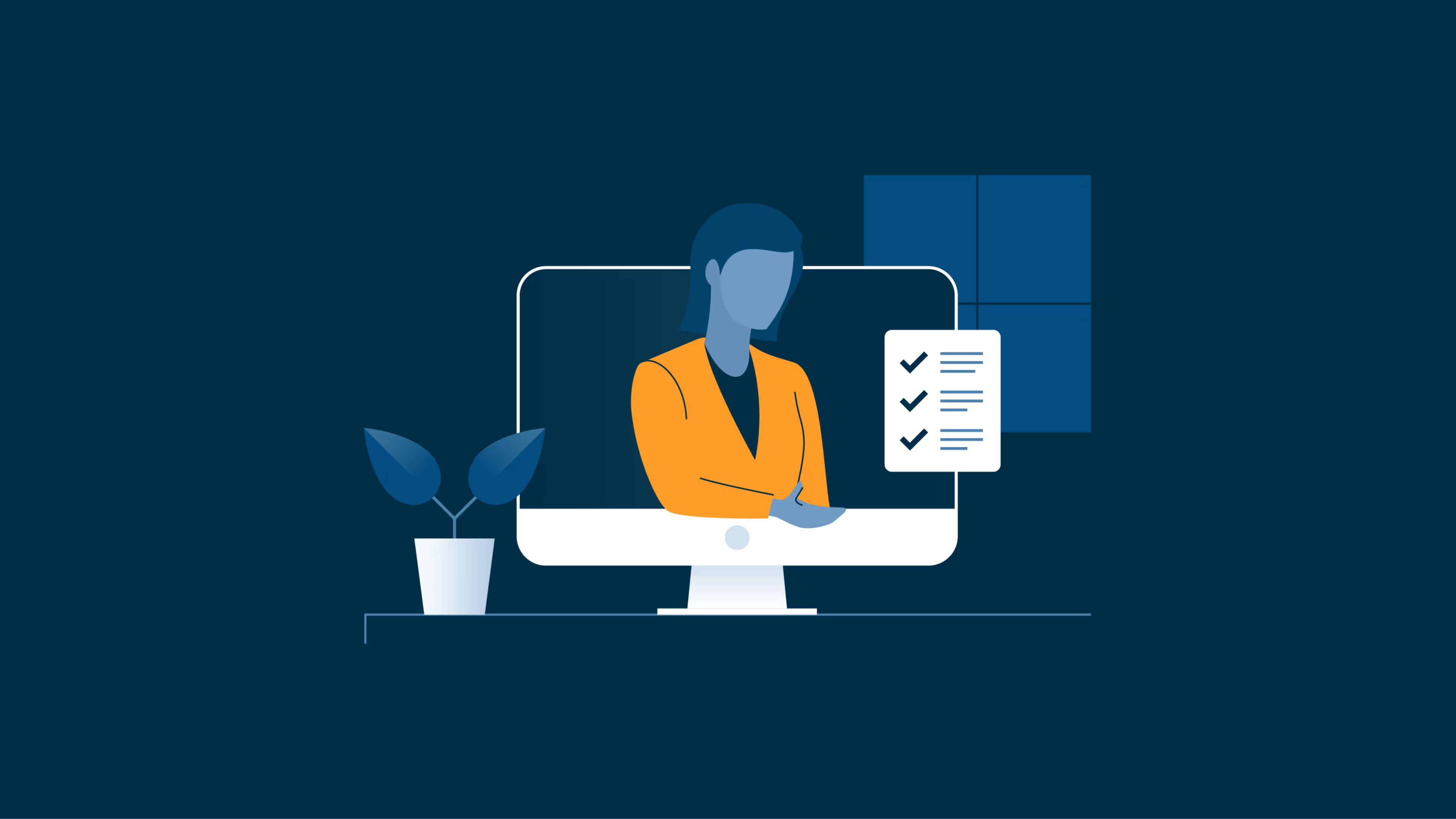A good CRM system can be a game changer for your business, no matter what industry you’re in. Learn more about the benefits of CRM software in this article.
If you had to choose just one type of software to help run your small, business-to-client (B2C) company, what type of software would it be?
While it would be nearly impossible to run a small business with only one type of software, any business that deals with customers won’t get far without CRM (customer relationship management) software. This tool stores and organizes reams of customer data, tracks customer interactions, automates customer outreach, and much more.
In fact, our 2021 Marketing Technology survey of more than 500 business leaders (methodology below) found that 94% of these small to midsize businesses (SMBs) use customer relationship management software. And interestingly enough, 83% reported that CRM software was either very effective or moderately effective at helping them achieve their marketing goals, more than any other type of software.

Want to learn more about the basics of customer relationship management software? Check out our complete buyers guide here.
Why is CRM important?
Customer relationship management software takes all of a business’s customer and client contact information and stores it in a database that can be accessed by relevant teams across an organization.
Before the widespread use of computers, this process had to be done manually with giant binders full of contact sheets or stacks of index cards. As you can imagine, this type of system made finding and sharing contact information, updating contacts, and tracking contact history a very arduous, time-consuming process.
Fortunately, modern CRM software makes customer relationship efforts much more efficient and effective for businesses. Even if your business only deals with a relatively small number of customers, CRM software is still very important.
Beyond just organizing names and contact information, a CRM solution can help your business keep track of how long it has been since you last contacted a customer, when customers last made a purchase, how long a customer has been doing business with your company, and more.
This helps businesses build stronger relationships with their customers (by making possible things like wishing a customer a happy birthday or notifying them when a favorite product has been improved, for example) which leads to increased customer loyalty and more revenue over time.
What are the benefits of CRM?
Imagine going back in time and taking all of your electronic customer contact information, printing it out onto index cards, and trying to operate your business this way. Every time you want to check in on a customer you have to break out a pile of cards and start hunting. Sounds like a mess, right?
If CRM software only stored and organized customer data electronically, it would still be a lifesaver for businesses. But it does much more than just that.
Here’s a partial list of some of the features included in most CRM systems that benefit businesses:
Centralized database. The main feature of most CRMs, the centralized database stores and organizes all of a business’s contact information and makes it accessible across the organization.
Contact management. It’s one thing to have all of your customer contact information safely stored in one place, but CRM software takes this a step further by allowing businesses to easily update contacts, add new contacts, and remove or reclassify contacts that are no longer active (for example, if a business closes).
Interaction tracking. Too much or too little contact with a customer puts businesses at risk of either annoying them into indifference or alienating them through neglect. Customer interaction tracking helps sales teams know exactly how long it’s been since last contact and even what was discussed during that interaction.
Scheduling/reminders. You could write a note to yourself and stick it to your computer monitor as a reminder to reach out to a certain customer on Monday morning. Or, you could let your CRM set an optimized schedule and remind you when to make those calls.
Integrations. Modern business software doesn’t just work well within its own isolated environment—it’s designed to work hand-in-hand with all of the other business software you use. For customer relationship management software, this can include integrations with your email system (for automatically importing new contacts, for example), calendar, and even your softphone system to automatically record and transcribe conversations, just to name a few. Check out this article for more useful CRM integrations.
All these features come together to make sales teams more productive and efficient. Here are just a few ways that CRM software features improve the effectiveness of your sales team and lead to better business outcomes:
Streamlined communication. With a CRM system, you reduce the risk of multiple sales people reaching out to the same contact within an overlapping time frame. Call notes can even help one sales rep pick up where another left off.
Better customer service. The more you know about your customers, the more you can help them. A CRM can keep track of everything from a specific customer’s birthday to issues that you’ve helped them through in the past.
Improved customer retention. With better customer service and more effective customer support, businesses will naturally enjoy improved customer satisfaction and customer retention and reduce churn.
Opportunities for automation. When all of your customer data is centralized and organized in one electronic system, automation is a breeze. A modern CRM can help sales teams automate customized email campaigns, interaction logging, distribution list segmentation, lead nurturing, and more.
Want to see what CRM automations look like in action? Check out this video:
Higher productivity for sales reps. When sales reps are able to harness the power of a modern CRM system, they can reach more contacts, convert more leads, and retain more customers. This leads to more quotas being met, and more commissions and bonuses being generated. This is a win-win for businesses and sales teams alike.
What are the different types of CRM software?
While all CRM software generally includes some form of contact database, interaction tracking, and lead management, there are many different types of CRM software tailored for different businesses, from car dealerships to beauty salons.
Other types of software, such as church management software and marketing automation software, typically include basic CRM features—such as a membership directory—as a standard.
According to Gartner, the four main types of CRM software are sales CRM software, marketing CRM software, customer service CRM software, and digital commerce CRM software.

Let’s take a closer look at each of these along with their benefits:
Sales CRM software is typically designed for sales teams with a focus on features such as lead generation and capture, commission tracking, and pipeline management. This software helps a sales rep and their team cultivate leads from first contact through repeat purchases.
Marketing CRM software is typically designed for marketing teams with a focus on marketing campaigns, with features such as marketing automation, email marketing, and social media marketing. This software helps a marketing team manage and analyze marketing campaigns across channels.
Customer service CRM software is typically designed for customer service teams with a focus on features such as interaction tracking, customer knowledge base, and chatbots. This software helps customer service teams assist customers from first contact through follow-up assistance, optimizing the customer experience.
Digital commerce CRM software is typically designed for online businesses with a focus on features such as customer analytics, loyalty management, and digital storefront. This software helps online businesses manage every aspect of assisting online customers.
Keep in mind that some of the more robust CRM systems on the market will likely include functionality from all of these different types of software.
In a broader sense, CRM software can be broken down into four different primary functions: operational, strategic, analytical, and collaborative.
Operational CRM generally focuses on workflow automation.
Strategic CRM generally focuses on customer interactions.
Analytical CRM generally focuses on analyzing customer data to yield actionable insights.
Collaborative CRM generally focuses on distributing customer information across multiple teams within an organization.
For an in-depth look at these different functions of a CRM tool, check out our resource guide, 4 Types of CRM Software Explained.
So how do you choose a CRM system?
Now that you know all about the benefits of CRM software, it’s time to choose the best CRM system for your business to start improving customer retention and engagement.
You can start by browsing our 2022 Shortlist of the top 25 CRM systems on the market, and then check out our in-depth guide on How To Choose a CRM.
Or if you’re wanting to read more about CRM software, check out the following articles:
What’s the Difference Between CRM and Marketing Automation Software?
Want the Best ROI on Your CRM Software Purchase? First, Set a Budget

2022 Capterra Shortlist: CRM software (Source)
